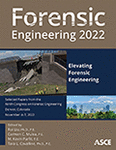Behavior of Internally Cured Concrete under Severe Conditions
Publication: Forensic Engineering 2022
ABSTRACT
Minimizing concrete shrinkage can decrease the cracking potential of the deck. Therefore, the use of internally cured concrete (ICC), which is a promising method to mitigate concrete shrinkage at an early age, has been increased. Therefore, the main objective of this research was to evaluate the behavior of the ICC and conventional concrete (CC) under severe conditions. The behavior of the ICC and CC subjected to heating and cooling cycles was investigated. This test was conducted using Ohio CTE Device (OCD). This device was used to surpass the limitations of the ASTM C531, CRD 39, and AASHTO TP60-00 by using a temperature range from 60oC to -60oC (140oF to -76oF) and a dry condition. A plastic shrinkage panel test was also used to determine the cracking potential under severe conditions. The specimens were exposed to air-flow using high-velocity fans for a duration of 24 h to ensure that cracks due to plastic shrinkage stabilized. In addition, the testing program determined compressive strength, splitting tensile strength, coefficient of thermal expansion, and free and restrained shrinkage. From the results, an internal damage was noted for the ICC specimens after one cycle of heating and cooling. This damage was not observed in the CC specimens. This behavior indicates that the pore structure of the lightweight fine aggregate in the ICC has a significant effect on the mechanism of damage in the concrete due to the freezing of water.
Get full access to this article
View all available purchase options and get full access to this chapter.
REFERENCES
AASHTO. (2012). AASHTO T334: Standard Method of Test for Estimating the Cracking Tendency of Concrete. American Association of State Highway and Transportation Officials. Washington, D.C.
ASTM. (2015). ASTM C 39: Standard Test Method for Compressive Strength of Cylindrical Concrete Specimens. ASTM International, West Conshohocken, PA.
ASTM. (2008). ASTM C157/C157M: Standard test method for length change of hardened hydraulic-cement mortar and concrete. ASTM International, West Conshohocken, PA.
ASTM. (2011). ASTM C496: Standard Test Method for Splitting Tensile Strength of Cylindrical Concrete Specimens, ASTM International, West Conshohocken, PA.
ASTM. (2015). ASTM C1761/ C1761M: Standard Specification for Lightweight Aggregate for Internal Curing of Concrete. ASTM International, West Conshohocken, PA.
Bentz, D. P. (2009). Influence of Internal Curing Using Lightweight Aggregates on Interfacial Transition Zone Percolation and Chloride Ingress in Mortars, Cement and Concrete Composites, 31, 285–289.
Byard, B. E. (2011). Early-Age Behavior of Lightweight Aggregate Concrete. Doctoral Dissertation, Auburn University, 311 pp.
Byard, B. E., Schindler, A. K., and Barnes, R. W. (2012). Early-age autogenous effects in internally cured concrete and mortar. Special Publication, 290, 1–18.
Essili, M. (2017). Control of Early Age Shrinkage Cracking in Reinforced Concrete Bridge Decks. Master Thesis, University of Akron.
Hamid, W. K., Steinberg, E. P., Khoury, I., Semendary, A. A., and Walsh, K. (2021). Thermally Induced Behavior of Paired Internally Cured Concrete and Conventional Concrete Decks in Composite Bridges. Journal of Bridge Engineering, 26(4), 04021016.
Hussein, H. H., Walsh, K. K., Sargand, S. M., and Steinberg, E. P. (2016). Effect of Extreme Temperatures on the Coefficient of Thermal Expansion for Ultra-High Performance Concrete. In proceedings of the First International Interactive Symposium on Ultra High Performance Concrete, DES Moines, Iowa.
Krauss, P. D., and Rogalla, E. A. (1996). Transverse cracking in newly constructed bridge decks., Transportation Research Board of the National Academies, Washington, D.C., 126 pp.
Kim, S. S., Nazzal, M. D., Akentuna, M., Abbas, A. R., and Arefin, M. S. (2015). Evaluation of low temperature cracking resistance of WMA. Ohio Department of Transportation, Office of Statewide Planning & Research.
RILEM Technical Committee 196-ICC. (2007). Internal Curing of Concrete. ed. K. Kovler and O.M. Jensen, Bagneux, RILEM Publications S.A.R.L.
Russell, H. G. (2017). Control of Concrete Cracking in Bridges., Transportation Research Board of the National Academies, Washington, D.C., 104 pp.
Semendary, A. A., Hamid, W., Khoury, I., and Steinberg, E. P. (2019). Influence of Heating and Cooling Temperature on the Performance of Tensile Interfacial Bond between High Strength Concrete and Ultra High Performance Concrete (UHPC). In proceedings of the Second International Interactive Symposium on Ultra High Performance Concrete, Albany, NY.
Information & Authors
Information
Published In
History
Published online: Nov 2, 2022
Authors
Metrics & Citations
Metrics
Citations
Download citation
If you have the appropriate software installed, you can download article citation data to the citation manager of your choice. Simply select your manager software from the list below and click Download.
